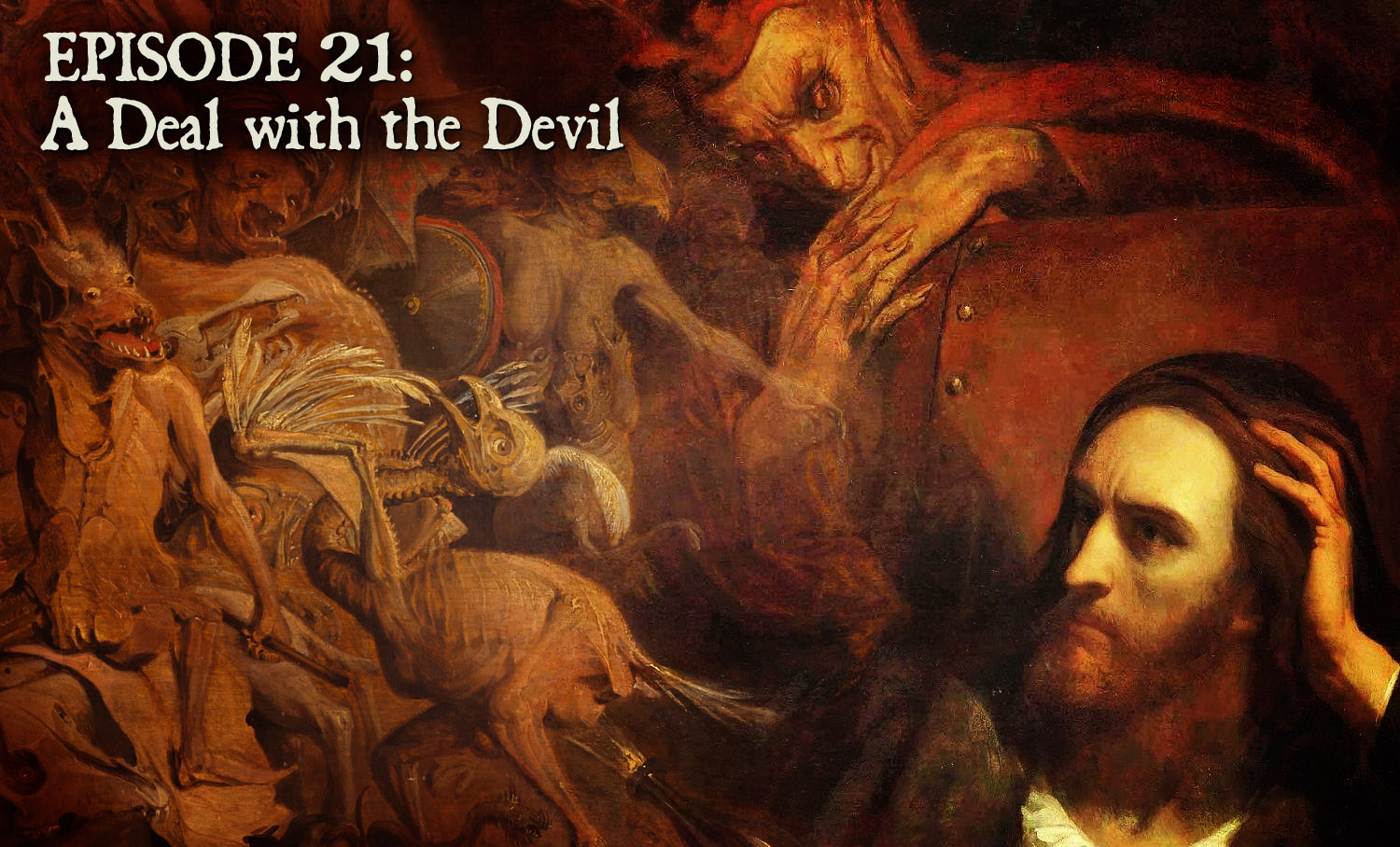
#21 A Deal with the Devil
Podcast: Play in new window | Download (Duration: 37:57 — 52.1MB)
Subscribe: Apple Podcasts | Spotify | Android | Podchaser | RSS | More
The legend of Faust is the archetypal deal with the Devil. This episode looks at the figure as represented in folklore, local legends, plays, puppet shows, literature, films, and opera.
A precedent for the tale seems to be the story of St. Theophilus, a cleric in 6th-century Adana (in modern Turkey) who, as legends have it, summoned the Devil to help elevate him to the status of bishop (and, yes, there is some repentence involved in this one, seeing as how he went down in Church history as a saint). He is the subject of a 13th-century French play, The Miracle of Theophilus, which happens to be the source of a chant to summon Lucifer written in an unknown language — one, which made its way into Wiccan traditions via Gerald Gardner, and which even ended up in the lyrics of the 1969 album Witchcraft Destroys Minds & Reaps Souls by the band Coven. The segment starts with a snippet from this cult album.
There does seem to have been an actual magician, astrologer, or alchemist by the name of Faust wandering southern Germany in the late 15th and early 16th century, though very little is known of his life other than passing references in a few letters and some town records noting that individuals by this who were banned for fraudulent or roguish activities. We look at a few of these historic references.
Legends regarding the figure are more plentiful. We hear of a number of supposedly dangerous grimoires attributed to Faust said to be kept at sites in Germany and also discuss a number of legendary feats of magic (including conjuring an entire castle along with a sumptuous, if unsatisfying, banquet for castle guests). We also have a look at a number of towns offering “evidence” that they were the site where the Devil came to claim the doctor, including one town that rents a room in an ancient inn where the grim event was said to have transpired.

The meat of our show is a look at the earliest written narrative on Faust, a chapbook published anonymously in Frankfurt in 1587, The History of Doctor Johann Faustus. We hear a dramatic, even cinematic, passage describing Faust’s summoning of the Devil in Germany’s Spessart forest (an area rich in folklore and home to the Brother’s Grimm). Also related are Faust’s whirlwind tour of of Hell, a number of comic supernatural pranks he plays, and, of course, the dramatic hour of reckoning and its grisly aftermath.

We next hear some snippets from one of the legend’s most prominent film treatments, the 1967 Richard Burton-Elizabeth Taylor vehicle Doctor Faustus. Though the subject of numerous negative reviews, the film may appeal to horror fans thanks to its visual styling similar to a Hammer film of the period. The wonderful 1926 German silent, Faust, by F.W. Murnau (director of Nosferatu) is also mentioned.

The script for Richard Burton’s film was the classic of Elizabethan stage,The Tragical History of the Life and Death of Doctor Faustus by Christopher Marlowe. Though the story presented by Marlowe is rather similar to the chapbook version previously discussed, we hear of a few comic additions made then jump forward a bit in theater history to William Mountfort’s pointedly comic 1697 work, The Life and Death of Dr Faustus, Made into a Farce, with Harlequin and Scaramouche. Wilkinson shares some monologues from the play spoken by two of the Seven Deadly Sins. We also have a look at the legend’s treatment in Faust puppet shows popular in Germany and Bohemia, a tradition that proved influential on the 1994 Czech film, Faust, Jan Švankmajer’s must-watch stop-motion/live-action treatment of the story. We hear bits of the audio from the Švankmajer film as well as a couple more Faust films, the Peter Cooke-Dudley Moore comedy Bedazzled (1967) and the nicely dreadful 2000 horror-superhero film, Faust: Love of the Damned.

The show closes with a look at Faust at the opera, namely Hector Berlioz’ 1846 work,The Damnation of Faust (with a nod to Charles Gounod’s operatic take on the tale). In particular we look at a famously disastrous staging of the Berlioz work by the Paris National Opera in 2015.